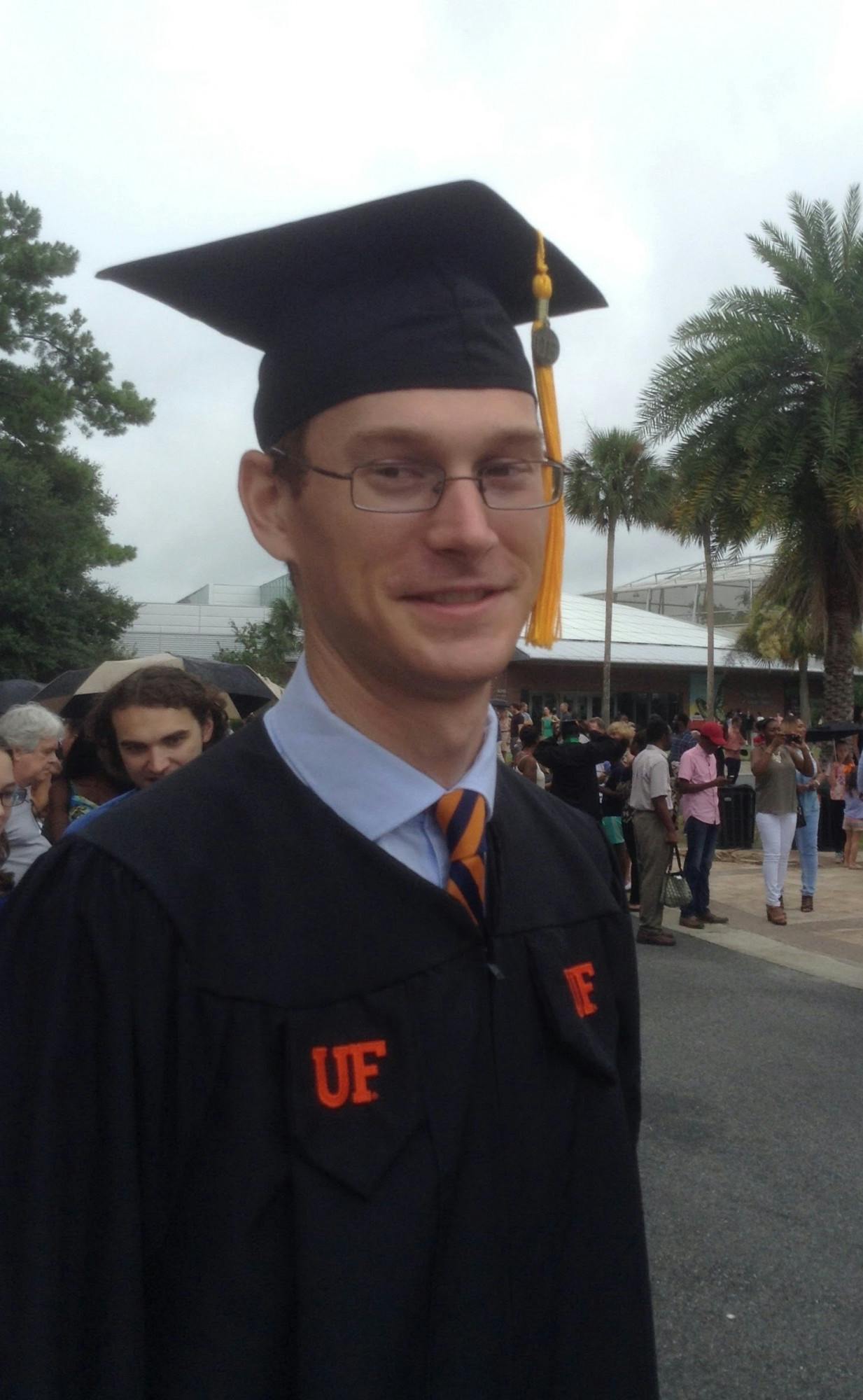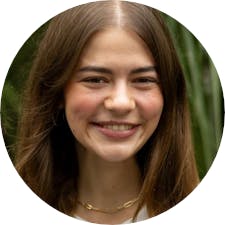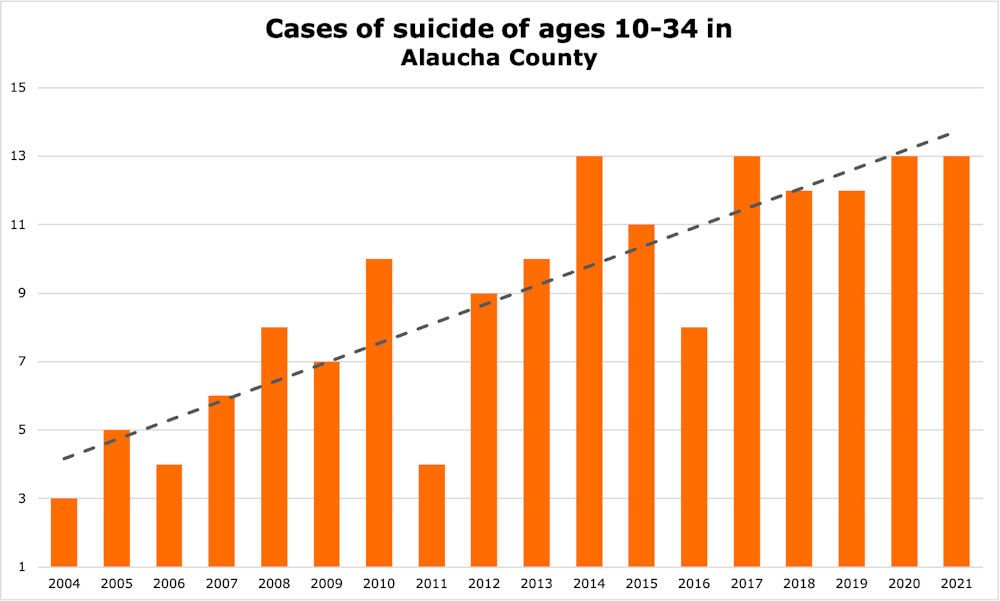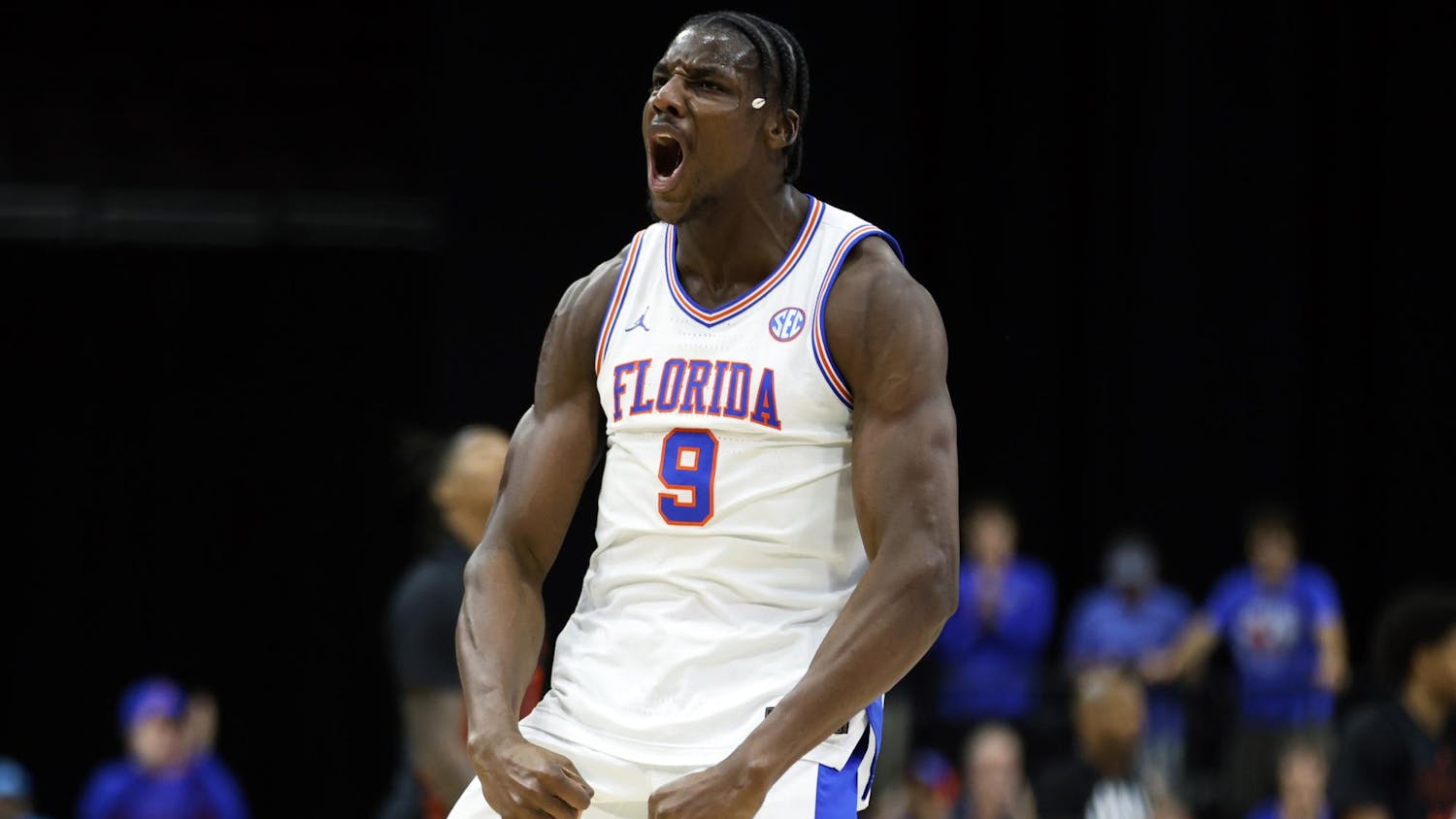Nash Cooper doesn’t want his $10,000 donation to be about him. Instead, the 59-year old veteran hopes his contribution to Helping Hands Clinic raises awareness about suicide prevention, especially for youth and those who, like him, have experienced homelessness.
Cooper made the donation to the volunteer-based clinic, which delivers health care to the poor and homeless in Gainesville, in honor of former volunteer Eric “Thomas” Anderson. Anderson, a UF pre-med alumnus, was one of the Helping Hands volunteers who helped Cooper regain his footing after losing his home in 2017.
Anderson died by suicide in 2019 at age 28 as a result of his battle with depression. By making his donation Sept. 26 during National Suicide Prevention Month, Cooper aims to honor his friend and prevent similar tragedies, he said.
Thomas Anderson and mental health for students
Cooper arrived in Gainesville in October 2017 as a borderline street-homeless veteran whose housing situation in St. Petersburg was destroyed by Hurricane Irma. He went to Helping Hands for medication and support, where Anderson was the volunteer who took his background information at his first-ever appointment.
“I said, ‘I don’t know anybody here,’ and he joked, ‘Well, you know me,’” Cooper said. “I said, ‘Well, yeah, but you’re not a friend,’ and he says, ‘Well, I can be.’”
True to his word, Anderson became Cooper’s best friend, even though Cooper was old enough to be his father, Cooper said.
Anderson was a giving person with a heart twice as big as his 6-foot-6 stature, Cooper said. He went out of his way to serve others — whether at Helping Hands, where he volunteered for five years, or by mentoring disadvantaged youth with the Baha’is of Gainesville, a religious group he joined in the years prior to his death.
Anderson had recently graduated from UF with three bachelor’s degrees in philosophy, mathematics and biochemistry, and finished his first round of applications to medical school when he met Cooper. The following year, Anderson’s medical school applications came back as rejections, and he took a job with a pest control company in New Orleans instead.
Although he did important work for public health, the weight of not meeting his original career goals worsened his depression, Cooper said.
Anderson took his life May 2, 2019, in DeLand, Florida.

“It’s a great loss,” said Shari O’Brien, a 76-year-old retired campus administrator for the University Lutheran Church where Anderson was a member. “[Anderson] made a difference in a lot of lives.”
Suicide is the second leading cause of death for people 10 to 34 years of age in the U.S., according to the Florida Department of Health. In Florida, 827 youth and young adults in that age range committed suicide in 2021. Of those deaths, 13 occurred in Alachua County.
Alachua County’s 10- to- 34-year-old suicide rate is below that of the state rate at 10.9 compared to 12.6 deaths per 100,000 people, but has increased about 46% per year since 2004. The statewide rate has seen less than half as much growth over the same period.
After noticing firsthand the growing trend of mental health struggles among students, the Lutheran church is working to build an office that will be staffed by local mental health specialists to provide free counseling for youth, O’Brien said.
“There’s a special increase in anxiety among college-aged students,” O’Brien said.
An increase in youth suicide translates to college campuses. Healthy Minds Study wrote the rate of students reporting a suicide attempt in the past year has increased 9.5% annually since 2007, on average.
Mental health struggles are exacerbated for undergraduate students like Anderson who choose the pre-med track. A 2010 study from the National Library of Medicine found pre-med students had a depression rate almost double that of their peers.
“The pressure of having research experience [and] clinical volunteer hours while also maintaining a perfect GPA is one of my biggest sources of stress and anxiety,” said Thui-Linh Thai, a second-year UF anthropology student. “Even if I get good grades, being pre-med always makes me feel like I’m not doing enough.”
While other students might not have to worry about post-graduate jobs not accepting them for their GPA, pre-med students feel pressure to maintain a 4.0 record to build a competitive medical school application, Thai said. Putting off sleep to study for challenging classes, a common occurrence among her pre-med peers, also worsens burnout, she said.
Helping Hands and mental health for the homeless
When he got his first disability benefit check, it took no time at all for Cooper to remember the work Helping Hands did for him, he said. Cooper decided to surprise the clinic with a donation, not just to show his appreciation to Helping Hands, but to the greater Gainesville community.
Cooper credits the people of Gainesville, including volunteers at clinics like Helping Hands as well as private citizens, with never letting him go hungry. He remembers one mechanic who let him sleep in his garage and another man who let him sleep in his van, he said.
“The people of Gainesville were so good to me,” Cooper said. “I needed to do something to give back, and I felt like this would be a way that would minister definitely to the homeless … and still be a part of the community as a whole.”
On Sept. 26, Cooper presented a $10,000 check to Helping Hands Executive Director Brendan Shortley at the Cade Museum, which was hosting a meeting for the Rotary Club of Gainesville.
The donation came as a surprise to Shortley who helped Helping Hands grow from its beginnings in the Gainesville Salvation Army dining room 35 years ago to its current two-story building, which operates as a complete medical facility.
“I feel like my face is still red,” Shortley said after the meeting’s conclusion. “I just found out they’ve been planning this thing for a month, and I never heard a word. … I’m so grateful.”
Shortley knows homeless individuals are another population disproportionately affected by suicide. The Harvard Review reported in 2017 that suicide rates among homeless populations are estimated at nine times that of the U.S. general population.
Helping Hands is the only free clinic in town for the homeless that has a complete staff of psychiatrists, a full psychology program and on-site medications. People without housing can have difficulty getting transportation to health appointments and securing the money to pay for them, and Helping Hands helps in both regards, Shortley said.
Beth Snarr, the 49-year-old pastor at First United Methodist Church of Gainesville, applauds Helping Hands for providing mental health programs tailored to homeless women, who are often more at-risk of violence and abuse, she said.
“They can go upstairs and they have support groups, they have a meal, they have a boutique, and that in itself is mental health because they can feel safe,” Snarr said. “It’s not just a physical health clinic — it’s body, mind and spirit.”
First United Methodist Church owns the Helping Hands building and provides a meal and worship service to its constituents every Monday, Snarr said.
Helping Hands has proved a top charity in Gainesville for effectively utilizing donation funds, Shortley said. Just 3% of donations go to administration, while 79% go to clinical services and 18% to pharmacy and medical supplies.
“Ten thousand dollars is going to transform lives,” Snarr said. “It’s the ultimate pay-it-forward.”
Cooper’s next initiative is petitioning the U.S. Postal Service to create the “Thomas Stamp.” The stamp would honor Anderson, who was an avid stamp collector, and it would also be the first-ever stamp dedicated to suicide awareness, Cooper said. He is currently collecting signatures in favor of the stamp, which he plans to present to Sen. Marco Rubio.
Helping Hands offers clinic hours Monday and Thursday evenings for homeless and poor individuals to receive psychiatric, medical and legal care.
UF students can visit the Counseling & Wellness Center for short-term counseling and medication management. Students in crisis can contact the CWC’s 24/7 crisis support hotline at (352) 392-1575 or the National Suicide Crisis Lifeline at 988.
Contact Zoey Thomas at zthomas@alligator.org. Follow her on Twitter @zoeythomas39.

Zoey is the Fall 2025 engagement managing editor of The Alligator. She has previously served as data editor and reported on the university, metro and enterprise desks. Over the summer, she interned for the Orlando Sentinel. Zoey inherited her mom's love of strong coffee and her dad's love of "Buffy the Vampire Slayer."






